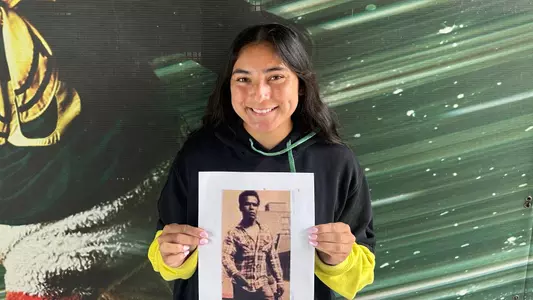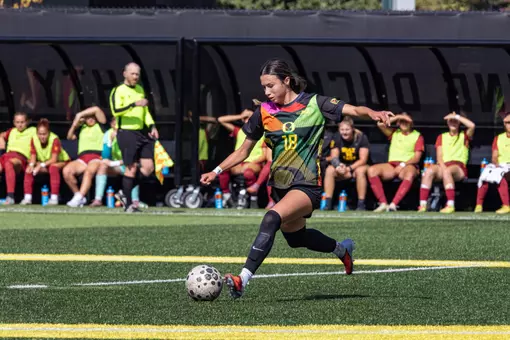
Student-Athletes Reimagined: An Ode to Apa
09/28/24 | Women's Soccer, BEOREGON
Trinity Morales of UO soccer honors her family's legacy to mark Hispanic Heritage Month.
Many years after my great-grandfather emigrated from Mexico, many years after my "Apa" opened his own business in New Mexico, I and the other great-grandkids would help out working in the greenhouse of his nursery.
At the end of the day, our Apa would pay us for the work we had done. Each of us would earn "five hundred dollars" – which ended up just being five one-dollar bills. My Apa didn't speak the best English, but he was able to look all his great-grandchildren in the eye and count "one hundred dollar, two hundred dollar…," up to five hundred dollars.
As he handed me the money, I always noticed his chapped, dried hands and dark skin complexion. I knew he had earned those features through hard work under the sun as a younger man. But I didn't know his full story until I got older.
At that point in my life, he was no longer around. But I am very honored that I can share his story and the legacy he left.
My great-grandfather, Gregorio Marquez, was born and raised in Mexico. My Apa was 15 years old when he became a migrant worker, going back and forth between the United State and Mexico. A few years later, he met my great-grandma and started their family in Juarez, Mexico.
My great-grandfather was able to accomplish his goals through all the hard work and sacrifice he put into working in the fields. As a migrant worker, he traveled to fields in Arizona, New Mexico, California, Idaho, and Oregon, picking potatoes, onions, lettuce and cabbage. Not only did he make sacrifices physically, he sacrificed emotionally by leaving his wife and children for months at a time.
After some time, he made enough money to buy his four kids and wife passports to move over the border and start their new life in New Mexico. He opened his own family business, named La Union Nursery, selling plants to people in La Union.
I always knew my Apa as a hard worker. Even up to his last year of life, when he was diagnosed with a tumor, he insisted to his children that he still have the opportunity to work in his greenhouse.
Many other Mexicans migrated with my Apa and made very similar sacrifices for their family so the next generations could succeed. Three generations later, his sacrifices paved the way for my success.
I am honored I get to recognize not only him but other Mexicans who also sacrificed to provide for their family. I know he will always be watching my journey from above.
Te quiero mucho, Apa.
At the end of the day, our Apa would pay us for the work we had done. Each of us would earn "five hundred dollars" – which ended up just being five one-dollar bills. My Apa didn't speak the best English, but he was able to look all his great-grandchildren in the eye and count "one hundred dollar, two hundred dollar…," up to five hundred dollars.
As he handed me the money, I always noticed his chapped, dried hands and dark skin complexion. I knew he had earned those features through hard work under the sun as a younger man. But I didn't know his full story until I got older.
At that point in my life, he was no longer around. But I am very honored that I can share his story and the legacy he left.
My great-grandfather, Gregorio Marquez, was born and raised in Mexico. My Apa was 15 years old when he became a migrant worker, going back and forth between the United State and Mexico. A few years later, he met my great-grandma and started their family in Juarez, Mexico.
My great-grandfather was able to accomplish his goals through all the hard work and sacrifice he put into working in the fields. As a migrant worker, he traveled to fields in Arizona, New Mexico, California, Idaho, and Oregon, picking potatoes, onions, lettuce and cabbage. Not only did he make sacrifices physically, he sacrificed emotionally by leaving his wife and children for months at a time.
After some time, he made enough money to buy his four kids and wife passports to move over the border and start their new life in New Mexico. He opened his own family business, named La Union Nursery, selling plants to people in La Union.
I always knew my Apa as a hard worker. Even up to his last year of life, when he was diagnosed with a tumor, he insisted to his children that he still have the opportunity to work in his greenhouse.
Many other Mexicans migrated with my Apa and made very similar sacrifices for their family so the next generations could succeed. Three generations later, his sacrifices paved the way for my success.
I am honored I get to recognize not only him but other Mexicans who also sacrificed to provide for their family. I know he will always be watching my journey from above.
Te quiero mucho, Apa.
Duck Insider 2-12-26
Thursday, February 12
Duck Insider 2-11-26
Thursday, February 12
Melyssa Lombardi: "Cannot wait to play our next game."
Wednesday, February 11
Kaylynn Jones: "Ready to go."
Wednesday, February 11













